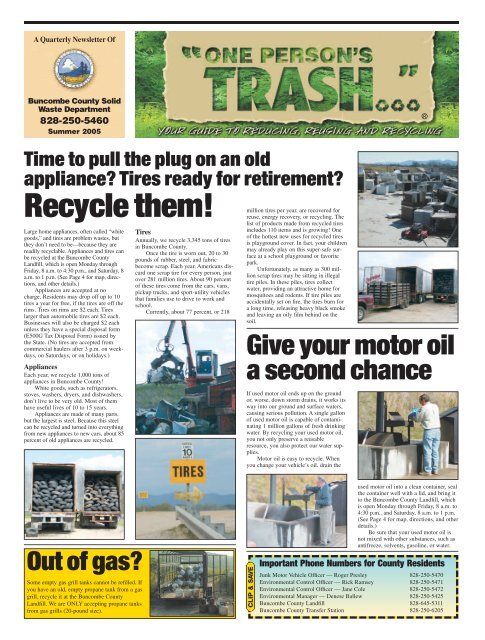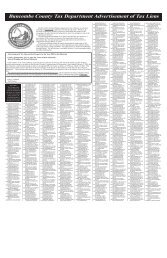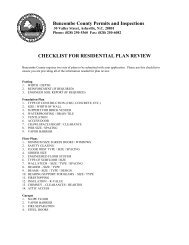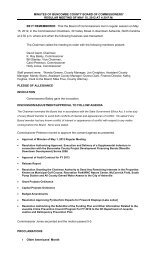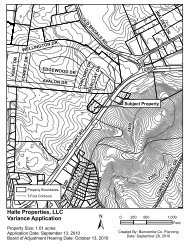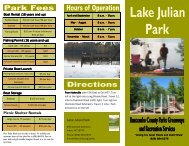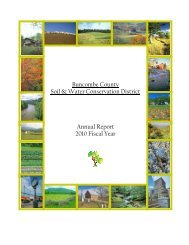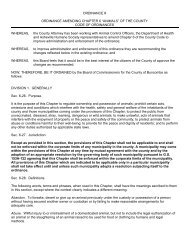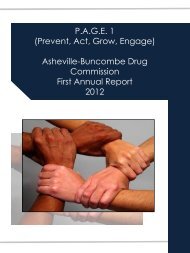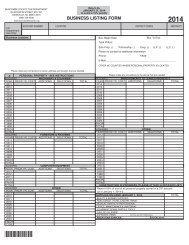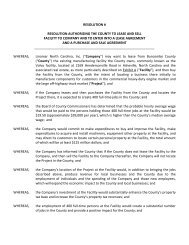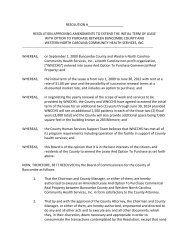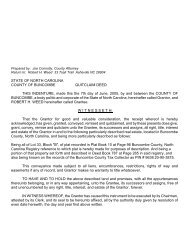Give Your Motor Oil - Buncombe County
Give Your Motor Oil - Buncombe County
Give Your Motor Oil - Buncombe County
You also want an ePaper? Increase the reach of your titles
YUMPU automatically turns print PDFs into web optimized ePapers that Google loves.
A Quarterly Newsletter Of<strong>Buncombe</strong> <strong>County</strong> SolidWaste Department828-250-5460Summer 2005®Time to pull the plug on an oldappliance? Tires ready for retirement?Recycle them!Large home appliances, often called “whitegoods,” and tires are problem wastes, butthey don’t need to be—because they arereadily recyclable. Appliances and tires canbe recycled at the <strong>Buncombe</strong> <strong>County</strong>Landfill, which is open Monday throughFriday, 8 a.m. to 4:30 p.m., and Saturday, 8a.m. to 1 p.m. (See Page 4 for map, directions,and other details.)Appliances are accepted at nocharge. Residents may drop off up to 10tires a year for free, if the tires are off therims. Tires on rims are $2 each. Tireslarger than automobile tires are $2 each.Businesses will also be charged $2 eachunless they have a special disposal form(E500G Tax Disposal Form) issued bythe State. (No tires are accepted fromcommercial haulers after 3 p.m. on weekdays,on Saturdays, or on holidays.)AppliancesEach year, we recycle 1,000 tons ofappliances in <strong>Buncombe</strong> <strong>County</strong>!White goods, such as refrigerators,stoves, washers, dryers, and dishwashers,don’t live to be very old. Most of themhave useful lives of 10 to 15 years.Appliances are made of many parts,but the largest is steel. Because this steelcan be recycled and turned into everythingfrom new appliances to new cars, about 85percent of old appliances are recycled.TiresAnnually, we recycle 3,345 tons of tiresin <strong>Buncombe</strong> <strong>County</strong>.Once the tire is worn out, 20 to 30pounds of rubber, steel, and fabricbecome scrap. Each year, Americans discardone scrap tire for every person, justover 281 million tires. About 90 percentof these tires come from the cars, vans,pickup trucks, and sport-utility vehiclesthat families use to drive to work andschool.Currently, about 77 percent, or 218million tires per year, are recovered forreuse, energy recovery, or recycling. Thelist of products made from recycled tiresincludes 110 items and is growing! Oneof the hottest new uses for recycled tiresis playground cover. In fact, your childrenmay already play on this super-safe surfaceat a school playground or favoritepark.Unfortunately, as many as 300 millionscrap tires may be sitting in illegaltire piles. In these piles, tires collectwater, providing an attractive home formosquitoes and rodents. If tire piles areaccidentally set on fire, the tires burn fora long time, releasing heavy black smokeand leaving an oily film behind on thesoil.<strong>Give</strong> your motor oila second chanceIf used motor oil ends up on the groundor, worse, down storm drains, it works itsway into our ground and surface waters,causing serious pollution. A single gallonof used motor oil is capable of contaminating1 million gallons of fresh drinkingwater. By recycling your used motor oil,you not only preserve a reusableresource, you also protect our water supplies.<strong>Motor</strong> oil is easy to recycle. Whenyou change your vehicle’s oil, drain theOut of gas?Some empty gas grill tanks cannot be refilled. Ifyou have an old, empty propane tank from a gasgrill, recycle it at the <strong>Buncombe</strong> <strong>County</strong>Landfill. We are ONLY accepting propane tanksfrom gas grills (20-pound size).CLIP & SAVEused motor oil into a clean container, sealthe container well with a lid, and bring itto the <strong>Buncombe</strong> <strong>County</strong> Landfill, whichis open Monday through Friday, 8 a.m. to4:30 p.m., and Saturday, 8 a.m. to 1 p.m.(See Page 4 for map, directions, and otherdetails.)Be sure that your used motor oil isnot mixed with other substances, such asantifreeze, solvents, gasoline, or water.Important Phone Numbers for <strong>County</strong> ResidentsJunk <strong>Motor</strong> Vehicle Officer — Roger Presley 828-250-5470Environmental Control Officer — Rick Ramsey 828-250-5471Environmental Control Officer — Jane Cole 828-250-5472Environmental Manager — Denese Ballew 828-250-5425<strong>Buncombe</strong> <strong>County</strong> Landfill 828-645-5311<strong>Buncombe</strong> <strong>County</strong> Transfer Station 828-250-6205
Page 2 Summer 2005 Page 3 Summer 200510tips forsummer shoppingWhether you’re getting ready for schoolyourself, getting someone else ready forschool, or just taking care of your ownend-of-summer shopping, there are waysthat you can reduce your waste, improveour environment, and save money, too.1. Before you shop,plan ahead.Evaluate whatyou alreadyhave on handand make a listof what youreally need.2. Reuse. Did you know that if youwashed and reused zipper plasticbags 50 times you would keep 1,500bags from being disposed—and saveat least $150 per box of 30 bags?Look through your own closets andshelves for forgotten tote bags, backpacks,lunch boxes, and refillablecontainers. Need organizers? Use oldshoe boxes or shipping boxes thatyou already have around the house.Reuse is also a lot less stressful thanhitting the stores.3. Shop reused first. Look for useditems through online services such aswww.freecycle.org, at garage sales,or at resale shops. You can findclothes, shoes, appliances, books,toys, games, office supplies, andhousehold goods.4. Select recycled-content paper. Eachback-to-school season, Americanspurchase about3.4 million tonsof printing andwriting papers.Every ton of100-percent,post-consumer,recycled-contentpapersaves 24 treesand 4,100 kilowatt hours of electricity!5. Look for other recycled-contentproducts, too. You should be able tofind pens, pencils, scissors, rulers,file folders, binders, storage containers,and jewelry. If you don’t, tell thestore manager that you want them.The store may be able to order themfor you now or stock them in thefuture.6. Purchase refilled or remanufacturedink jet cartridges for your printers.Or, buy a refilling kit and do it yourself.7. Enjoy cool recycled accessories,such as folders made from old maps,clipboards made from old computerparts, and more. Look for these atdepartment and specialty stores. Or,shop online.8. Shop for food and flowers atFarmers Markets. Not only do thesemarkets support local farmers, theyalso provide fresh food without theextra transportation or excess packaging.Wouldn’t it be nice to enjoyfruits and vegetables without throwingaway a lot of plastic bags andcontainers? For more informationabout Farmers Markets or to locatethem here or as you travel, go towww.ams.usda.gov/farmersmarkets/.9. Develop your own sense of style.Surround yourself with items thatyou find comfortable and comforting.You’ll probably find that you areless tempted to replace what youhave to buy something “trendy.”10. Avoid buying collectiblesthat are heretoday but “so yesterday”tomorrow. In1999, 250 millionStar Wars actionfigures were sold,weighing about5,700 tons. If youaren’t a collector, stayaway from unneededsouvenirs.On Earth Day,Consumer Reports, anationwide consumer-producttesting and rating organization,launched a new website aimed at “greenconsumers.” The site features environmentalevaluations of various products,making the point that often those productsthat are better for the environmentwill also protect public health and savemoney. To learn more about becoming agreener consumer, visit www.greenerchoices.org.The Center for a New AmericanDream also offers advice to consumers.For more information, go to www.newdream.org.You’ll find great informationunder “Buy Wisely” and “Make aDifference.”How well do youknow your hauler?During February, NBC “Today Show” cohostMatt Lauer moonlighted as one ofthe guys in green—a New York CityDepartment of Sanitation crew member.After Lauer’s day-long gig, he encouragedpeople to practice kindness towardsanitation workers, who are doing a jobthat needs to be done.Another New Yorker, anthropologyprofessor Robin Nagle, also moonlightedfor the Sanitation Department. Nagle, whoteaches the course “Garbage in Gotham:The Anthropology of Trash” at New YorkUniversity, wanted to find out firsthandwhat life is like on the streets for the city’ssanitation crews. She spent three weeks aspart of a crew and chronicled her experiencesin an online diary at Slate magazine(slate.msn.com/id/2106849/entry/2107445/or go to www.slate.com and search for“Nagle”). A book-length account, We AllWear Green: Loading Out with SanitationWorkers in New York, will be published in2006.Practice kindness toward yourhaulers. Follow setout guidelines. Don’tzoom around slow or stopped trucks.<strong>Give</strong> them room to do their jobs. They areQUOTESI realized then and there that nomatter how many worms I raised,or was responsible for other peopleraising, the earth could only bebetter off. I was going to restoreand replenish rather than destroyand exploit the earth.You, too, can vermicompost. Thissimple process with the funnyname is a lot easier to do than youthought. After all, if worms eat mygarbage, they will eat yours, too.Mary Appelhof,the “Worm Woman”Author of Worms Eat My Garbageand champion of vermicomposting1936 – 2005doing work that we need to have done.And if you get the chance, say “thankyou.”Bag,borrow or stealA new Internet service can deliver hip and trendy handbags toyour door—and take them back when you tire of them. “BagBorrow Or Steal” is a monthly membership service fordesigner handbags. You select your desired level of service,depending on which designers interest you and whetheryou want to borrow one or two bags at a time. Then,you select the bag you want to borrow and it isshipped to you. You use it until you are tired of it andwant a new one. Then you send it back and your nextchoice is shipped to you. It’s a “Netflix” for handbags!If you decide that one of your borrowed bags isa keeper, you can buy it by selecting the “Steal It”option and receiving a price quotation.For more information, visit www.BagBorrowOrSteal.com.REQUOTEDRecycling aids tsunamirecovery effortsThe tsunami that hit the Indian Ocean lastwinter left behind huge quantities of debris.In Banda Aceh, which is located in Indonesiaand was one of the hardest hit cities, thetsunami left behind as much as 13 millioncubic yards of debris, enough to fill threefootball fields to a height of three stories.To deal with this debris, provideemployment for those who were made joblessby the tsunami, and capture usableresources, the United Nations DevelopmentProgramme announced in February that asmany as 1,000 people in Banda Aceh, andeventually up to 30,000 in all tsunami-damagedareas, would be employed in wasterecovery efforts.The recovered materials will be sortedto be sold for recycling (plastic and metal),used as compost for land regeneration(organic waste), turned into fill for erodedareas (dirt, crushed concrete, and stone), orutilized in the construction of temporary andpermanent housing (bricks and wood). Theinitial sorting will be done by hand, pullingout the reusable and recyclable materials.After that, heavy equipment will be used tocrush concrete and stone or chip wood.In addition to providing a fair wage,vaccinations, appropriate clothing, andhealth and safety training, this recoveryeffort also allows residents to participate ina positive and constructive way in rebuildingtheir homes, businesses, communities,and lives.Engineers give bestgrade to solid wasteEvery few years, the AmericanSociety of Civil Engineers(ASCE) issues a “Report Cardfor America’s Infrastructure.”The 2005 report card gaveAmerica’s infrastructure an overallgrade of D, but Solid Wastereceived a C+— the best gradegiven in this year’s report. In additionto solid waste, infrastructure evaluatedby ASCE included transportation, watersystems, energy, schools, and parks. ASCEWaste professionals aren’t theonly people taking a good lookat trash. During April 2004,Prudential (yes...the financialservices giant) interviewedmore than 1,000 adults inGreat Britain about their trash.What did they find? The averageBritish adult wastes the equivalentof about $3,150 on food, luxuryitems, entertainment, travel, gadgets,and hobbies. This amount would pay off theannual average credit card debt and leavemoney left over for investment. Accordingto the report, “In short our wastefulness preventsus from getting ahead.”This is not to suggest that allmoney spent on hobbies,travel, or other items thatmade the list is wastedor wasteful. Instead thesurvey focused onitems that went unusedor underused. Forinstance, many respondentshad purchased allof the equipment to begin a hobby orexercise program and then neverused any of it. Plus, they admitted toC+looks at a variety of factors, includingcondition, capacity, funding, and outlook.Since the first report card wasissued in 1988, Solid Waste hasraised its grade from C- to C+,largely because the system forreducing, recycling, composting,and disposing of trash has improved,resulting in a dramatically increasednational recycling rate which places lesslong-term demand on disposal facilities.The Soggy Lettuce Reportowning unread books, unwatchedmovies, ordering drinks they didn’tfinish at restaurants, buyingnew passes to venues becausepreviously purchased ones hadbeen left at home, and even failingto use plane tickets. A fewhonest souls confessed to hidingpurchases from family membersand friends—and never using the itemsat all. While many of these items wereeventually donated to be used by someoneelse, the money spent on them had beenwasted by the original buyer.More money is wasted onfood than any other category.A third of therespondents reportedthrowing away foodregularly, includingfrozen foods too oldto eat and restaurantleftovers takenhome but not eaten.The item most likely to be discardedeach week? Lettuce.To read the full report, go towww.pru.co.uk/include/userinclude/pdf/presscenter/soggy_lettuce_report.pdf.Princely paperfor PotterBloomsbury, the British publisher of J.K. Rowling’s newest installment in theHarry Potter series, Harry Potter and the Half Blood Prince, will be printingall of the United Kingdom editions on 30-percent Forest Stewardship CouncilCertified Paper. This certification guarantees that paper was not made from thetrees of ancient forests. Last year, Bloomsbury printed the UK paperback editionsof the previous book, Harry Potter and the Order of the Phoenix, on 10and 20 percent recycled-content paper.The Canadian publisher, Raincoast Books, printed the last book on postconsumer,recycled-content, ancient forest friendly paper. The new book willbe printed on the same type of paper.Scholastic, the U.S. publisher, is also printing on paper that is free offiber from ancient forests.into theDid you know that there are 106.5million acres of wilderness preservedin the United States? This includes677 National Wilderness PreservationAreas in 44 states. These areas, alongwith our state and national parks, providewild places where we can bereminded of our connection to thewonders of nature.Visiting a wild place might be agood way to finish off your summer. Ifyou go, remember to think about yourenergy use and transportation emissions.For instance, a car full of peoplegets more miles per gallon per person.If you’re traveling a long distancewith a small number of people, a trainor plane may be a lower-impactoption. At your destination, walk,hike, and bike as much as possible.Although the places that you’llvisit are wild, they aren’t wild abouttrash. Whatever you carry in with youshould be placed in an appropriaterecycling bin or trash can. In somelocations, you’ll be asked to carry yourown recyclables and waste out of thepark or wilderness area. Place trashonly in properly designated bins. If youdon’t find recycling bins while you’retraveling, bring your recyclableshome—we’d love to have them!Learn more aboutwilderness areas andour national parks!www.wilderness.netwww.wildernesswatch.orgwww.nps.govwww.leavenotrace.org“Something will have goneout of us as a people if weever let the remainingwilderness be destroyed.”Wallace Stegner, 1909-1993“A wilderness, in contrastwith those areas whereman and his own worksdominate the landscape, ishereby recognized as anarea where the earth andcommunity of life areuntrammeled by man,where man himself is avisitor who does notremain.”Wilderness Act, 1964Travel with reusable mugs andcups. Even if no discount is offeredfor the refill of your own container,you’ll still be reducing your waste.Take along a canvas bag or two tocarry your purchases and say “nothanks” to plastic and paper storebags. Keep an old towel in your car orbag to clean up spills.Don’t take papers that you don’tneed or won’t read. How many timeshave you arrived home with a fistfulof untouched brochures? Did you evergo back and read them? Take only thebrochures and flyers that you willneed. If you don’t want to keep them,return them to the information deskfor another visitor at the end of yourvisit.Remember—take only photos andleave behind only footprints.
Page 4 Summer 2005In April, we sponsored aMercury ThermometerExchange Project. During thethree-week collection period,75 people exchanged thermometersat the booth atAsheville Earth Day orGreenlife Grocery, and 357people delivered thermometersand other items at theRiverLink offices. Theydropped off all of these mercury-containingitems:• 752 thermometers• One 10-pound bottle ofmercury• Four 1-pound bottles ofmercury• One DustBuster that hadbeen used to clean upspilled mercury• One barometer• Several outdoor temperaturegaugesEach resident whodropped off a thermometeror other mercury-containingdevice was given afree, digital thermometer.Our goal was to getmercury fever thermometersout of homes where abroken thermometer canpollute indoor air and createhealth risks for residents.We want your suggestions,questions and comments!We are also available to speak to yourclub or class about solid waste, wastereduction, recycling and composting.<strong>Buncombe</strong> <strong>County</strong> Solid WasteDepartment2229 Riverside DriveAsheville, NC 28804828-250-5460Web: buncombecounty.orgCopyright© 2005<strong>Buncombe</strong> <strong>County</strong> andEco Partners, Inc. All rights reserved.PRINTED ON RECYCLED PAPER70% POST-CONSUMER NEWSCONTENT, USING SOY INKSBe “sharps”smartEach year, more than 2 billionsyringes, pen needles, and lancets,referred to as “sharps,” are used bypeople for their own in-home medicalcare. Because all of these itemshave had contact with blood, theyare considered infectious waste. Assuch, if they are disposed improperly,they can potentially contaminatechildren who may take themfrom the trash or collection andlandfill employees who can bestuck when sharps puncture bags.In either case, contact with usedsharps creates the risk of injuryand illness.If you use sharps at homefor your own medical care,place the sharps in punctureresistantcontainers. (Opaque,plastic detergent containerswork best, but plastic popbottles and milk jugs with atwist cap or metal coffee canswith the lid reinforced with ducttape will also be accepted.)Label your container “Sharps.”When the container is full,secure the twist cap or lid withheavy tape, such as duct tape.Then, deliver it to the TransferStation, which is located on BrevardRoad. For directions and hours, see above.For more information about sharps,go to www.safeneedledisposal.org.Directions tothe TransferStation:From I-240, take exit 1B(Brevard Road/Hwy. 191). At thetraffic light, take Highway 191North. Turn left onto ShelburneRoad. Turn left onto HominyCreek Road. The TransferStation will be on the left.From I-40, take exit 47 (BrevardRoad/Hwy. 191). At the trafficlight, take Highway 191 North.After crossing I-240, turn leftonto Shelburne Road. Turn leftonto Hominy Creek Road. TheTransfer Station will be on theleft.You can drop off all of these items for recycling at the<strong>Buncombe</strong> <strong>County</strong> Landfill at no charge:• Lead-acid batteries• Newspaper and brown paper bags• Corrugated cardboard• Commingled recyclable containers, including #1 & #2 plastic(milk jugs, soft drink bottles, laundry detergent jugs); aluminumcans; clear, green, and brown glass bottles and jars;and steel cans• <strong>Motor</strong> oilsTransfer Station offersnearby recyclingThe Transfer Station, which is located onBrevard Road, is open Monday throughFriday, 8 a.m. to 4:30 p.m., and Saturday,8 a.m. to 3 p.m.During all open hours, residents candrop off these recyclables at no charge:• Lead-acid batteries• Newspaper and brown paper bags• Corrugated cardboard• “Blue Bag” or commingled recyclableShelburne Rd.Shelburne Rd.National GuardArmory26containers, including #1 & #2 plastic;aluminum cans; clear, green, andbrown glass; and steel cansWe also accept reusable corrugatedcardboard moving boxes and shippingcartons. Please break down and flatten theboxes for storage.Plus, you can drop off “sharps,” suchas needles and lancets, used at home forpersonal medical care.240191 NNExit 1BExit 1BTRANSFERSTATION240Hominy Creek Rd.S40191 NExit 47To BiltmoreLandfill offers drop-off for residents’trash, recyclables, and moreDirections tothe <strong>Buncombe</strong><strong>County</strong>Landfill:From I-240 East orWest, take Exit 4A to19/23 North. Travel1 mile and then takeUNC-A exit. At the endof the exit, turn left. Goto traffic light and turnright onto 251 North.Continue on 251 Northfor 9 miles to PantherBranch Road. Turn rightonto Panther BranchRoad and travel 1 /10of a mile to the<strong>Buncombe</strong> <strong>County</strong>Landfill, which islocated on the right.The new landfill is6 miles north of theold landfill.19-23 North240Panther Branch Rd.I-240 East251Westgate Bridge251LANDFILL19-23 NWeavervilleExit 4AOld MarshallHighway• Tires• White goods, including stoves, refrigerators, air conditioners,freezers, and all metals• Empty, triple-rinsed pesticide containers• Empty propane tanks (20-pound, gas grill type ONLY)You can drop off household trash at the Landfill. There is afee to dispose of trash.The Landfill is open to accept trash and recyclables Mondaythrough Friday, 8 a.m. to 4:30 p.m., and Saturday, 8 a.m. to 1 p.m.HHW ande-waste acceptedNweeklyUNCA Exit 25119-23 NWeavervilleExit 4AI-240West<strong>Buncombe</strong> <strong>County</strong> accepts householdhazardous waste (HHW) and electronicsevery Friday between 9 a.m. and 3p.m. at a special drop-off area at theLandfill (see map).Each week, we accept electronicsfrom residents at no charge. Businesseswill also be able to drop off electronics,but they will be charged a fee of 60cents per pound.HHW is accepted for $2 per gallonfor paint-related material, such as paintthinner, kerosene, gasoline, and paint.Other materials, such as lawn and gardenchemicals, are accepted at nocharge.For more information, call 250-5460 or the Landfill at 645-5311.


